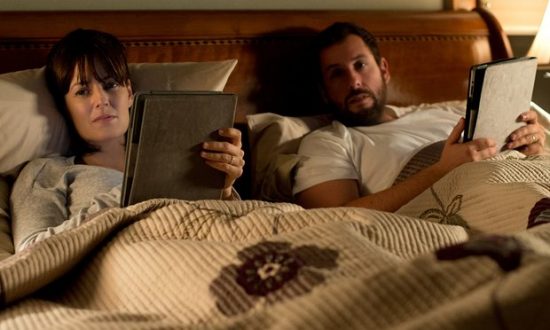Review: Men, Women & Children
How annoying are people who check their mobiles during a film? Those brightly glowing screens in your peripheral vision serve as powerful reminder that we’re now interacting on screens more often than physically. It was a sweet irony when I caught someone checking their mobile during my screening of Men, Women & Children; Jason Reitman’s latest directorial outing and a movie to make us think about how technology influences our lives.
Reitman’s movie focuses on how the bombardment of imagery, taunts, suggestion and visual brain trippers affects a group of Middle-American parents and teenagers, primarily in their romantic and familial attachments. From a teen’s obsession with pro-ana websites and another who can’t get excited unless he’s being dominated by an internet porn star, this film pulls no punches in its analysis of the harm that the internet is doing to us. The parents are shown to be as guilty as their children of misusing apps for their own ends, one example being Jennifer Garner’s obsessive mother tracking her daughters movements and texts using communication software. Those in long-term relationships will also squirm with familiar recognition of Adam Sandler and Rosemarie DeWitts’ web-based normality, lying in bed together playing on their iPads, communicating only through the medium of Words with Friends.
As the film progresses, we’re shown how the desire fulfilment that the internet allows serves to unspool the characters’ happiness. The examples are endless, with Judy Greer’s failed starlet injecting all of her energies into making her daughter an online success, pushing the boundaries of what’s acceptable dress code for a 15 year old. However, if there is a main focus it is on sweethearts played by Ansel Elgort (fresh from success in Divergent and The Fault in Our Stars) and Kaitlyn Dever, who show that not all high school kids are being corrupted by the pull of the web.
The stories weave in and out, with Facebook pages and text conversations woven into the visual of film, together with an odd, omnicient narration from Emma Thompson. I think it’s intended to show the relative unimportance of these stories in the universe as a whole, by comparing them with Carl Sagan’s Pale Blue Dot Theory. It wants to punctuate the film as David Fincher did so well by slipping in pornographic images into Fight Club, but I’m unsure as to whether it adds to this already packed story.
Reitman’s film is less diatribe, more wry observance on how we are all guilty of using tech as a short-cut to our desires. It has moments of judgement, but perhaps I was projecting my own guilt, as the behaviours are instantly recognisable. Men, Women and Children also marks a move towards Internet as a genre, nestling in with the wistful Her, and Joseph Gordon-Levitt’s directorial debut Don Jon, films that illustrate the effects that the sexuality we’re fed on screen has on our own realities.
Finally, I offer a genuine surprise – Adam Sandler is wonderful here. He is so natural in drama it’s a shame his back catalogue isn’t peppered with roles like this and Punch Drunk Love.
It’s a scary and paranoid world we live in, and Men, Women and Children isn’t always a pleasant watch, but it is the most multi-layered and provocative film that Reitman has ever made. Whether you’re angst-ridden teen, anguished parent or mildly social Millenial it is worth seeing a film that offers a healthy does of realism without an Instagram-filter. I doubt the woman who had to check her phone mid-screening understood Reitman’s point, but I hope that it’s not too late for the rest of us.










